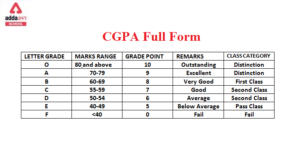Table of Contents
The complete form of PCS is Provincial Civil Service. Every state in India administers its own PCS exam through its individual State Public Service Commission (SPSC). PCS does not have a standardized national exam. For instance, the Uttar Pradesh Public Service Commission (UPPSC) administers the PCS examination for Uttar Pradesh. PCS officers are part of Group A and Group B in the state government services.
PCS Full Form
Full form is Provincial Civil Service in its entire form. PCS is a state-level civil service that falls under Group A and Group B of the executive branch of the Government of State service. This is a multi-tiered exam used to choose employees for the state civil service. The Uttar Pradesh Public Service Commission is in charge of this (UPPSC). Combined State / Upper Subordinate Services Examination is the name of the notice for PCS.
Full Form of PCS
The “Full form of PCS” stands for “Provincial Civil Service.” The Provincial Civil Service is a state-level civil service examination conducted by the respective state public service commissions in India. It is an administrative service that recruits officers for various administrative and executive positions within the state government.
The officers selected through the PCS examination serve in different departments and play crucial roles in the governance and administration of their respective states.
PCS Full Form in UPSC
The Union Public Service Commission is the federal government body in India responsible for organizing examinations to hire civil servants for various national administrative roles. Remember that the UPSC framework refers to the civil services of states apart from Uttar Pradesh as “PCS.” The PCS exam is administered by the state public service commissions in every state and is distinct from the UPSC test.
State PCS Full Form and Eligibility
Candidates who want to appear for the state PCS exams must satisfy the eligibility criteria laid out by the Public Service Commission of that particular state. Some of the basic eligibility requirements are given hereunder.
- Candidates for PCS must have a Bachelor’s Degree from an accredited university or an equivalent qualification.
- Candidates must be at least 21 years old and no older than 40 years old.
- Candidates must be a citizen of India.
- Physical Measurements/Fitness are also required for eligibility for the PCS exam for specific positions, since candidates must undertake medical exams after the interview.
- Physical measurements are required for posts such as Superintendent of Jail, District Commandant Home Guards, and Excise Inspector, Assistant Conservator of Forests, Range Forest Officer, Dy. Superintendent of Police.
PCS Officer Post Full Form & Duties
When posted in field positions such as sub-divisional magistrate, additional city magistrate, or city magistrate, a PCS officer’s typical responsibilities include:
- Collecting land revenue and acting as a court in matters of revenue and crime (revenue courts and criminal courts of executive magistrate).
- Maintaining law and order, and implementing Union and State Government policies at the grass-roots level. And to function as a government agent on the ground, i.e. to operate as a go-between for the public and the government.
- Consultation with the minister-in-charge, additional chief secretary/principal secretary, and secretary of the concerned department.
- Handle the administration and everyday operations of the government, including policy formation and implementation.
PCS Officer Political Influence
Directly recruited IAS officers frequently allege that promotee IAS officers are given priority in field postings because of their contact with politicians, which they develop over the course of their two decades of service. Many politicians are accused of appointing ‘their men’ as divisional commissioners and district magistrates because the state government is frequently dominated by regional parties.
The Central Bureau of Investigation (CBI) has also begun an investigation into the recruitment of PCS officials by the Uttar Pradesh Public Service Commission (UPPSC) beginning in 2012.
PCS Full Form- Syllabus
Every Indian state organizes its own PCS exam, with slight variations in the syllabus but the majority remains consistent with the one outlined below:
| Name of the Subject | Syllabus Topics |
|
General Studies |
|
|
General Knowledge |
|
|
Optional Subjects |
|
PSC Exam Full Form
The term “PCS exam” can refer to different exams in various contexts, but one common interpretation is “Provincial Civil Services Examination” or “Public Civil Services Examination.” These exams are typically conducted by different state governments in India to recruit candidates for various administrative and civil service positions within the state government.
However, it’s important to note that the exact full form and details of the PCS exam can vary from one state to another in India, as different states may have their own administrative structures and recruitment processes. Therefore, if you are looking for information about a specific PCS exam, it’s recommended to specify the state or region you are interested in for more accurate information.
PCS Officer
A PCS (Provincial Civil Service) officer is a government official who works at the provincial or state level in India. The PCS is responsible for various administrative and executive functions within a particular state or province. These officers play a crucial role in the implementation of government policies and programs at the regional level.
The PCS officers are recruited through a competitive examination conducted by the respective state’s public service commission. The recruitment process typically consists of a written examination, followed by an interview or personality test. Once selected, PCS officers are assigned various roles and responsibilities in different government departments and agencies, such as revenue, police, administration, finance, and more, depending on their specialization and the needs of the state government.
The responsibilities of a PCS officer may include:
- Administration: Overseeing the day-to-day functioning of government offices and ensuring the efficient delivery of public services.
- Law and Order: Maintaining law and order within their jurisdiction, often working in coordination with the police department.
- Revenue Collection: Managing revenue collection and land records, including land surveys and land disputes.
- Developmental Projects: Implementing government development schemes and projects in their respective areas.
- Public Welfare: Addressing public grievances and providing assistance to citizens in accessing government services.
- Policy Implementation: Playing a crucial role in the implementation of government policies and programs.
- Supervision: Supervising subordinate staff and ensuring the smooth operation of government offices.
PCS officers are typically divided into various ranks, such as Deputy Collector, Deputy Superintendent of Police, Assistant Commissioner, and others, depending on their specialization and the state government’s structure.
It’s important to note that the specific roles and responsibilities of PCS officers may vary from one state to another in India, as each state has its own administrative structure and requirements.
PCS Full Form: Difference Between IAS and PCS Officers
Frequently, there is confusion between the roles of IAS and PCS officers, as their duties may appear similar, yet they are distinct. The President of India is responsible for appointing IAS officers, who in turn work under the State Government and are allocated a cadre based on current conditions. PCS officers are handpicked by the State Governor, placing them completely under the authority of the State Government.
An IAS officer holds more importance than a PCS officer in terms of pay, duties, authority, and responsibilities as the former oversees operations nationwide, whereas the latter is responsible for managing affairs only within their state cadre.
| Related Articles | |
| CBSE Full Form | ICSE Full Form |
| CEO Full Form | SOP Full Form |
| AM PM Full Form | ACP Full Form |
| RTF (Right to Freedom) Full Form | USB Full Form |
| MD Full Form | IRS Full Form |



 CGPA Full Form, Meaning in Hindi, Kannad...
CGPA Full Form, Meaning in Hindi, Kannad...
 FIR Full Form, Check What is the Full Fo...
FIR Full Form, Check What is the Full Fo...
 TGT Full Form, Check What is the Full Fo...
TGT Full Form, Check What is the Full Fo...










